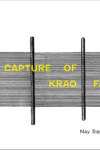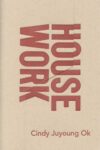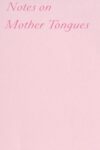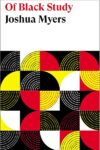
[Ugly Duckling Presse; 2020]
The Ugly Duckling website informs us that “in 2020, UDP is publishing twenty pamphlets of commissioned essays on subjects close to UDP’s commitments — collective work, translation, performance, pedagogy, poetics, and small press publishing — each offering a different approach to the pamphlet as a form of working in the present.” I decided to review all twenty, in order of publication, and chose the form of hundred-word capsule reviews which you can read below. The most urgent themes were community, translation, bookmaking, materiality, and the fight against neoliberal capitalism, colonialism, and white supremacy. Touchstone authors include Zora Neale Hurston, Frantz Fanon, Fred Moten, and Walter Benjamin. Enjoy!
Translation is a Mode=Translation is an Anti-neocolonial Mode
Don Mee Choi
Starting with translation’s no accident. We commence from a place of brokenness, separation, and rupture — of history. “I speak as a twin,” writes Don Mee Choi, in a text haunted by mirrors, doubles, and even the sundered land of Korea, which remains technically at war. The work of poet Kim Hyesoon connects back to the realm of mothers and shamans who spoke a language set aside for the common people — one more border for translation to traverse. The speech we absorb like mother’s milk or military-surplus cornbread is already marked by violent histories it’s our duty to see and unwork.
Golem Soveticus: Prigov as Brecht and Warhol in One Persona
Aleksandr Skidan
Dmitri Prigov, perhaps unfamiliar to the American reader, is translated by reference to the estrangements of Warhol & Brecht in a text rendered out of Russian language and Soviet context. The militant Brecht and the apolitical Warhol might make strange bedfellows, but they’re consciously chosen antinomies of a dialectic Skidan stages to illuminate the rupture of art discourse in the twentieth century. The intimation of Prigov’s poetic project as a response to the conjuncture of Russia’s inheritances (eschatological theology, European enlightenment, and the wreck of the twentieth century) casts a strange backlight on what inheritances American art-workers might be reckoning with now.
Thirty-Odd Functions of Voice in the Poetry of Alice Notley
Steven Zultanski
Alice Notley is the greatest living English-language poet, and the critical neglect of her work is a scandal. Zultanski zooms in on the central question of voice across her entire body of writing — a topic that knits together the early New York School lyric poems with the epics that emerged after The Descent of Alette. It’s wonderful to see how the essayist’s close attention to Notley’s verse and prose allows the work to thematize itself and its own purpose. The thirty-odd divisions articulate the artwork and, by so doing, make it available to us in its radiant and bewildering plenitude.
The World Has Been Empty Since The Postcard
Simon Cutts
The singular delight of something unique and odd turning up in the mail is one of the small but definite casualties of our epoch. Cutts’ postcards, in photo-reproduction, combine the charm of Fluxus ephemera with the assertiveness of concrete poetry, particularly the work of frequent interlocutor Ian Hamilton Finlay. Loss of the postcard is also loss of materiality, the substrate of memory. When you get a good postcard, you usually put it up on the wall. This pamphlet, itself a formally reflexive comment on the postcard’s fugitivity, inquires if we can dream apart from the Internet at all anymore.
Notes Toward A Pamphlet
Sergio Chejfec
How can one be sure whether or not this poet exists? The instinctive itch to apply ourselves to the Internet as judge of, first, the existence, and then the value of all things arises only to horrify us by its epistemology, and how far even those of us born before its advent have fallen into its sovereign logic. The speculative and idealist passivity of Samich raises the shade of some of Fernando Pessoa’s more thwarted heteronyms. The train’s temporality, like the postcard or typewriter, is now boutique and retro, but encysts a real longing because it’s proper to an unobtainable past.
Phong Nha, the Making of an American Smile
Tammy Nguyen
W. G. Sebald’s epiphany at an optician’s was so important that he wrote about it repeatedly — whether or not it actually happened. Nguyen’s diasporic narrator relays her life through international travel and the lifelong progress of expensive dental responses to her absent lateral incisors. Personal odontological realities intersect with American class-striving and the ‘wind teeth’ of Vietnamese geological formations — only one stop on this text’s tour (Jurassic Park and Plato’s Cave are among the others). A lot’s packed in, not least a picture of the narrator’s situation in family and history. It turns out that an American smile ends up costing a lot.
Reincarnating Marechera: Notes on a Speculative Archive
Tinashe Mushakavanhu
Dambudzo Marechera’s legend precedes him, and lives a life separate from his work. The whiff of the outlaw that surrounds discussion of his writing could tempt comparisons with, say, Rimbaud or Genet — iconoclastic criminals who created permanent art out of unlikely lives. These comparisons obscure the ineluctably social and political character of Marechera’s texts — as colonial and, then, postcolonial, response to Black tyrants as well as white oppressors. This pamphlet’s remarkable tact lies in summoning the legend through his archive — state police documents, posthumous fan letters, testimonials — while always keeping the myth distinct from the man and his work.
The First Books of David Henderson & Mary Korte: A Research
Iris Cushing
Impossible to read this beautiful text now without feeling the loss of Diane di Prima, whose vast literary output is only part of her contribution to poetry. Cushing’s meditation on the inaugural books of two less well-known poets zigzags back and forth through time, from the late ‘60s and the communities of experiment and revolt in which these authors worked, to a present where they have become elders and ancestors. Attention to archives and interviews brings forth both the material basis of poetry in bookstores, small presses, conferences, and constellations like Umbra. This pamphlet’s a reminder to take our work seriously.
Quartet
Claudia La Rocco
In Mourning and Melancholia, Freud warns that the deepest harms of grieving can only be forestalled by a commitment to Trauerarbeit — the work of mourning. La Rocco’s lyric essay weaves together the lives, works, and words of four men she knew who died in a three-year span into a meditation on criticism and lineage, as well as the density of memory created through time by communities of artists moving through common spaces. The text takes up final books by each writer — in some cases, sketches, notes, or fragments, to set its own parataxis in hum. Shelve with Roland Barthes’ Mourning Diary.
The End
Aditi Machado
Hadn’t thought about “Archaic Torso of Apollo” in a while! Expecting, perhaps, an updated riff on Herrnstein Smith’s classic Poetic Closure, I read instead a careening tour through the workshop factories of the American academy. Machado’s question of ends is more about how students are taught to write ends, and other parts of poems — epiphanically? Experimentally? What sometimes, following Joyce, is called an epiphany, has some relation to the gnomes and sententiae of Greek and Latin poetry — maxims at which the poet arrives in the course of contemplation. Their cast is rarely subjective. Perhaps the impersonal remains a necessary ingredient?
Notes on Mother Tongues
Mirene Arsanios
All lifelong our language goes with us, representing us in social situations and even to ourselves. But if our relations to motherlands and mothers are troubled or cancelled, what claim do we have on mother tongues? Shot through with Fanon’s insights into the colonized mind’s subjectivity, Arsanios’ text dwells on the languages — including Arabic, French, and English — that make up the language the narrator bears, as well as the inheritances she receives from her family and transmits to her children. Amidst historical dislocations, hope abides for a “motherless” tongue, “coming to us from future sentences,” or from the dead.
Being Human is an Occult Practice
Magdalena Zurawski
Thank God for a real-deal manifesto — and a full-on defense of poetry at that! This remarkable text outlines its unapologetic claim for the place of the making and study of poetry, not despite their apparent uselessness, but precisely because they are useless — and because they FEEL good. (The caps courtesy of the author). Adducing Zora Neale Hurston’s millworkers as a corrective to the aesthetic theories of Kant and Wordsworth, with detours into Robert Duncan’s H.D. Book and the history of Hermeticism, Zurawski lucidly lays out an impassioned call to strike at the productivist heart of neoliberal capitalism before it eats up the world forever.
A Mano / By Hand
Nicole Cecilia Delgado
Delgado’s autobiographical account of passage through international bohemian spaces of writing and bookmaking is beautifully textured, at moments painful in its celebration of worlds that have passed, and in its own way, a manifesto for a cultural practice that is slow, deliberate, community-centered, and indifferent to the dictates of neoliberal capitalism. (I was reminded of Iris Cushing’s pamphlet). Books published on trash discarded from the Borders megachain (itself consigned to the dustbin of history) and printing done without electricity in the aftermath of Hurricane Maria intimate a world beyond the present, where we continue to gather in pursuit of art.
Electric Sarcasm
Dimitra Ioannou
The ruination of global financial systems plays out in our hearts, our bodies, our streets, our bedrooms, and our languages. The national agony of Greece becomes the voice of our narrator returning again and again to tax and debt. Ioannou records the finding of international researchers during a study of Athens’ wastewater plant: there’s a direct relation between antidepressant consumption and the first bailout of 2010. 2020’s experience of the international pandemic is another reminder of the intimate relationship between individual mental health, negligent or abusive governance, and the communities of care that attempt to intercede between these two.
Invisible Horizon: A Religious Pamphlet
Sibyl Kempson
We’re often so busy doing things (art, politics, community) that we don’t take the time to document what we’ve undertaken or reflect on its meaning. Kempson accounts for a three-year cycle of performance in a sort of auto-archive that includes tech angst about possible lost photos, a complete roster of performers and their roles, and an outline of some of the mythologies underpinning the work. Those of us who weren’t there end up with at least a sense of the shape of what it was. Such documents are not only evidence but also an inspiration as to what remains possible.
The classroom is burning, let’s dream about a School of Improper Education
KUNCI Study Forum & Collective
The immune system we all can be against the cancers of capitalism and colonialism proposes the same defenses time and again: collectivized resources, new ways to read the holy books, innovations in art and cultural practice, and, always, alternative education. This fictitious three-way email correspondence situates the reader in the complex history of Indonesian subjection and resistance, and reveals the unique resources of pedagogy available in this national context — ready to be fused with Jacques Ranciere and The Undercommons. That people worldwide are working from the same handful of books should encourage us: intellectual labor still contributes to revolutionary practice!
Of Forests & of Farms: On Faculty and Failure
Adjua Gargi Nzinga Greaves
“(Anti-blackness is anti-environmental.),” the text declares in the largest of its several type-sizes. We read a forest of declarations and quotations linking agricultural practice, relations (including linguistic relations) to the wild world, and the epistemic white supremacy continually haunting the U.S. of A. What it means to “blacken up,” in a recurring phrase borrowed from Fred Moten, involves deeper solidarity with all that lives, including the vegetable world. “(Like all Black women, plants dream of the day that their wounds will matter.)” Whether contemporary environmental justice movements can address these issues will be the difference between their success and their failure.
Say Translation is Art
Sawako Nakayasu
In an act of divine translation, the prophet Muhammad began many surahs of the Qu’ran with the imperative verb, “Say,” because the dictating angel Jibreel was instructing him as to what the prophet should record. And Gertrude Stein says somewhere: “I do not repeat, I insist.” Nakayasu’s text enjoins us, with Jibreel’s verb and Stein’s urgency, to open the field of what is called translation past normative restrictions and into a queered and pleasurable landscape abounding with practitioners (here cited by initials). As the prolific translator of Lusophone literature Chris Daniels puts it, “translation is a cure for cultural narcissism”.
Slow Down and Walk: A Conversation
Nadine George-Graves and Okwui Okpokwasili
As the pamphlet series progresses, history enters — first the coronavirus pandemic, then the wave of national uprisings following the police murder of George Floyd. This text presents a public conversation held over Zoom — another timestamp of 2020. A conversation between two old friends therefore reflects both a shared history of art and the crises and despairs of the immediate present. The pandemic season’s been hard for artists in many ways, and it’s valuable to have documents of response. Much of art consists in encouraging ourselves and others to not die, despite the world’s weight. “Slow Down and Walk” is solid advice.
The Semblable
Chantal Maillard
Guessing the title’s semblable alluded to the famous first poem of Baudelaire’s Fleurs du Mal, I was surprised to read a philosophical ethics based in interspecies compassion and a critique of representation. With moral roots in Sanskrit concepts that animate the Buddhist and Jain religions, Maillard finds hope for a world without violence in overcoming the indifference she believes we evince concerning the suffering of those we do not see as like ourselves (including nonhuman animals). The citation of Derrida’s late work here sounds the theme of the possibility of justice that none of us can now afford to ignore.
David Brazil is a poet, pastor, and translator. His third book of poetry, Holy Ghost (City Lights, 2017), was nominated for a California Book Award. He is the editor of Wave Books’s edition of Philip Whalen’s Scenes of Life at the Capital. With Kevin Killian, he co-edited The Kenning Anthology of Poets Theater, 1945-1985. With Chika Okoye, he was the founding curator of the Berkeley Art Museum’s Black Life series, focusing on cultural production in the African diaspora. He has presented his work at Cambridge University, Johns Hopkins, and San Francisco State University, among other venues. He lives in New Orleans.
This post may contain affiliate links.







